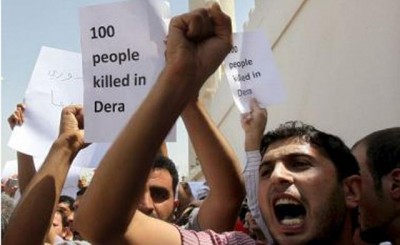
By: By ANNE ALLMELING
No one really knows what’s happened, and this is exactly what Syria’s president Bashar Al Assad wants. As long as there is no evidence, anything could have happened in the Syrian town of Jirahs Shugur. And “anything” is probably better than the truth.
Why else would Mr. Assad do everything in his power to cover up recent events? One hundred and twenty policemen were killed by “armed gangs” in northwest Syria, state television said on Monday. But activists dispute the official account. They are speaking of a mutiny – something that, if it were proven to be true, would undermine Mr. Assad’s power significantly. As in the past few weeks, little – if anything – is done to find out what really happened in Jirahs Shugur. Independent observers have long since been muzzled, and journalists are being prevented from working.
“Foreign reporters cannot get visas to go there and local journalists are all being jailed or forced to remain silent,” Reporters Without Borders secretary general Jean- François Julliard says. Even before the beginning of the uprisings, journalists had a tough time in Syria. The country ranks 173th out of 178 in the Press Freedom Index 2010. No other Arab nation was classified below this. The little freedom that remained for journalists in Syria has vanished completely since the beginning of the protests.
But even without journalists being allowed to cover the recent events, Mr. Assad managed to discredit himself. His regime’s response to the uprising has been extremely brutal, and more than 1,100 people are said to have died since the beginning of the protests. There is very little verifiable information that enables us to fully understand what is happening in Syria right now; numbers and names are being disputed.
But even the Syrian president cannot cover up everything. That is why he is offering us his interpretation of the uprisings.
According to state television, the policemen in Jirahs Shugur were “on their way to rescue citizens being terrorized.” This is what Bashar Al Assad’s regime is performing to perfection: telling the world that the security of the Syrian state is being threatened by evil forces – and that all the government does is defending its own people.
Interior Minister Mohammed Ibrahim Al Shaar warned in a statement read on television that the authorities would hit back: “The state will act firmly, with force and in line with the law,” he said. “It will not stay arms folded in the face of armed attacks on the security of the homeland.”
Declaring any opposition to the regime to be “terrorists,” Mr. Assad perfidiously legitimizes the crackdown on protesters – much like Yemen’s president Ali Abdullah Saleh, who got US-support to fight Al Qaeda in the Arabian Peninsula and extended his attacks on the opposition to his presidency.
The fact that no one really knows what happened in Jirahs Shugur and all the other cities in Syria makes these crackdowns even easier: Terrorists infiltrating an Arab country is not exactly unlikely, and it would not even be a surprise if protesters turned to violence in order defend themselves. If either of this proves to be true, it would certainly have a negative effect on the country. But for many people, not knowing the truth is worse than anything.

Leave a Reply
You must be logged in to post a comment.